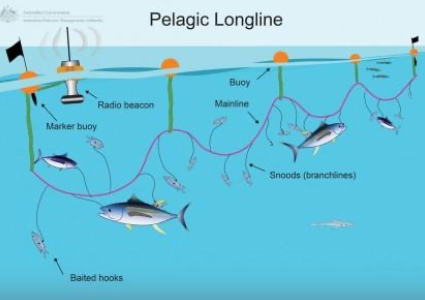Pledging
These are the original issues in this subcategory

- ILLEGAL FISHING
- BYCATCH
- LONGLINE FISHING

Pelagic fish live in the open waters of our seas and oceans. Many species migrate great distances each year. However, most shark, swordfish and tuna populations are approaching, or have already reached, unsustainable levels. Much of this decline has been attributed to the advent of longline fishing. Perfected by the Japanese, this method uses up to 80 miles of fishing lines with thousands of baited hooks that are trailed behind a single vessel. During the first decade of the advent of longline fishing, catches declined from 10 fish per hundred hooks to just one per hundred. Studies have concluded that at least 80% of each of the world’s large ocean species including cod, halibut, tuna, swordfish and marlin has disappeared from the world’s oceans since 1950.
Research has found that commercial fishing has become so efficient that it typically takes just 15-20 years to remove 80% or more of any species unlucky enough to be targeted. Tuna populations have taken the brunt of commercial overfishing. The Atlantic bluefin tuna population has decreased about 40% over the past 25 years. One study of Pacific bluefin tuna, long thought to have healthy population numbers, has now been estimated to have declined more than 95% due to overfishing. It appears that for many years, the Japanese fishing industry has been greatly underreporting its Pacific bluefin tuna catch, thus enabling it continue catching these fish that are so popular in sushi and sashimi restaurants. Recently, one 650-pound tuna was sold for $3 million in a Japanese fish market. However, most tuna that are now caught are juveniles not old enough to breed.
Proposed Legislation: Reintroduction of H.R.1024 - To establish in the National Marine Fisheries Service a pelagic longline highly migratory species bycatch and mortality reduction research program, and for other purposes. (108th Congress 2003-2004)
Prospective Sponsor: Rep. Adam Schiff (CA)
Tweet
Research has found that commercial fishing has become so efficient that it typically takes just 15-20 years to remove 80% or more of any species unlucky enough to be targeted. Tuna populations have taken the brunt of commercial overfishing. The Atlantic bluefin tuna population has decreased about 40% over the past 25 years. One study of Pacific bluefin tuna, long thought to have healthy population numbers, has now been estimated to have declined more than 95% due to overfishing. It appears that for many years, the Japanese fishing industry has been greatly underreporting its Pacific bluefin tuna catch, thus enabling it continue catching these fish that are so popular in sushi and sashimi restaurants. Recently, one 650-pound tuna was sold for $3 million in a Japanese fish market. However, most tuna that are now caught are juveniles not old enough to breed.
Proposed Legislation: Reintroduction of H.R.1024 - To establish in the National Marine Fisheries Service a pelagic longline highly migratory species bycatch and mortality reduction research program, and for other purposes. (108th Congress 2003-2004)
Prospective Sponsor: Rep. Adam Schiff (CA)
Tweet
- I oppose reforming current longline fishing policy and wish to donate resources to the campaign committee of Speaker Mike Johnson (LA).
- I support: 1.) Creating, within the National Marine Fisheries Service (NMFS), a pelagic longline highly migratory species bycatch and mortality reduction research program. 2.) Requiring the program to determine the impact of existing time and area closures designed to reduce bycatch of longline vessels. 3.) Authorizing the NMFS to grant permits for vessels with NMFS-provided observers to fish in closed areas of the Atlantic Ocean in furtherance of the research program. 4.) Closing to pelagic longline fishing the lower mid-Atlantic Conservation Zone between August 15 and October 1 and the upper mid-Atlantic Conservation Zone between July 15 and October 1 of each year. And wish to donate resources to the campaign committee of Rep. Adam Schiff (CA) and/or to an advocate group currently working with this issue.
- I support:
1.) Creating, within the National Marine Fisheries Service (NMFS), a pelagic longline highly migratory species bycatch and mortality reduction research program.
2.) Requiring the program to determine the impact of existing time and area closures designed to reduce bycatch of longline vessels.
3.) Authorizing the NMFS to grant permits for vessels with NMFS-provided observers to fish in closed areas of the Atlantic Ocean in furtherance of the research program.
4.) Closing to pelagic longline fishing the lower mid-Atlantic Conservation Zone between August 15 and October 1 and the upper mid-Atlantic Conservation Zone between July 15 and October 1 of each year.
And wish to donate resources to the campaign committee of Rep. Adam Schiff (CA) and/or to an advocate group currently working with this issue.
You May Pledge Your Support For This Issue With A Monetary
Donation And By Writing A Letter To Your Representatives
Donation And By Writing A Letter To Your Representatives
Please login to pledge
Pledge Period - Opening Date
January 20, 2025
Pledge Period - Closing Date
January 26, 2025
Trustee Election - Begins
January 27, 2025
